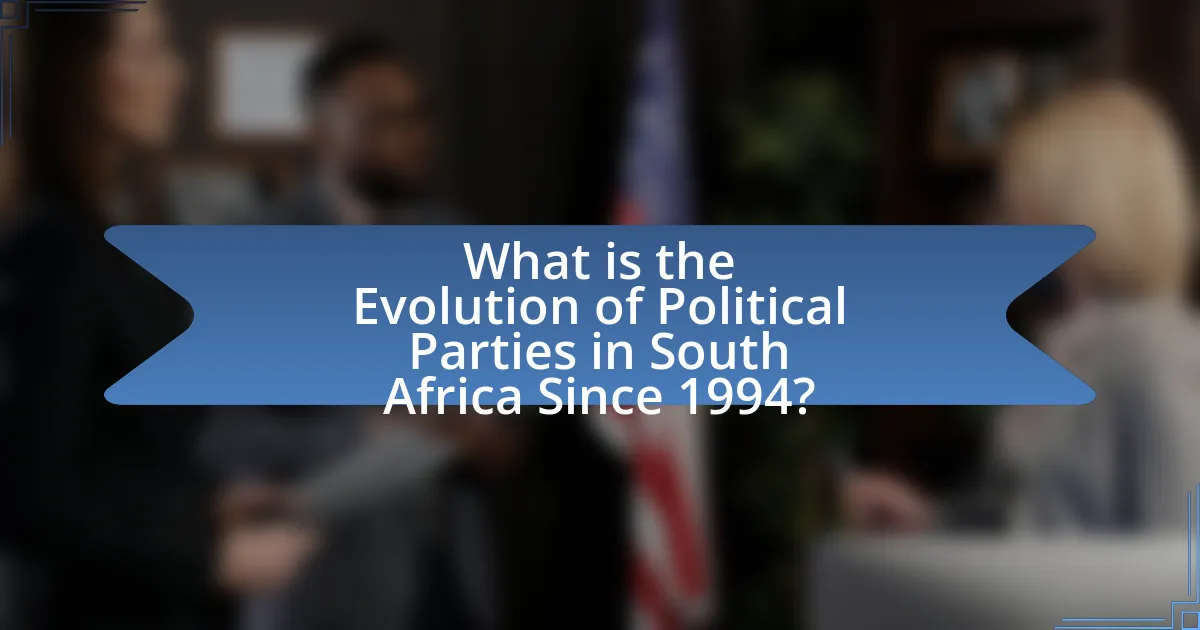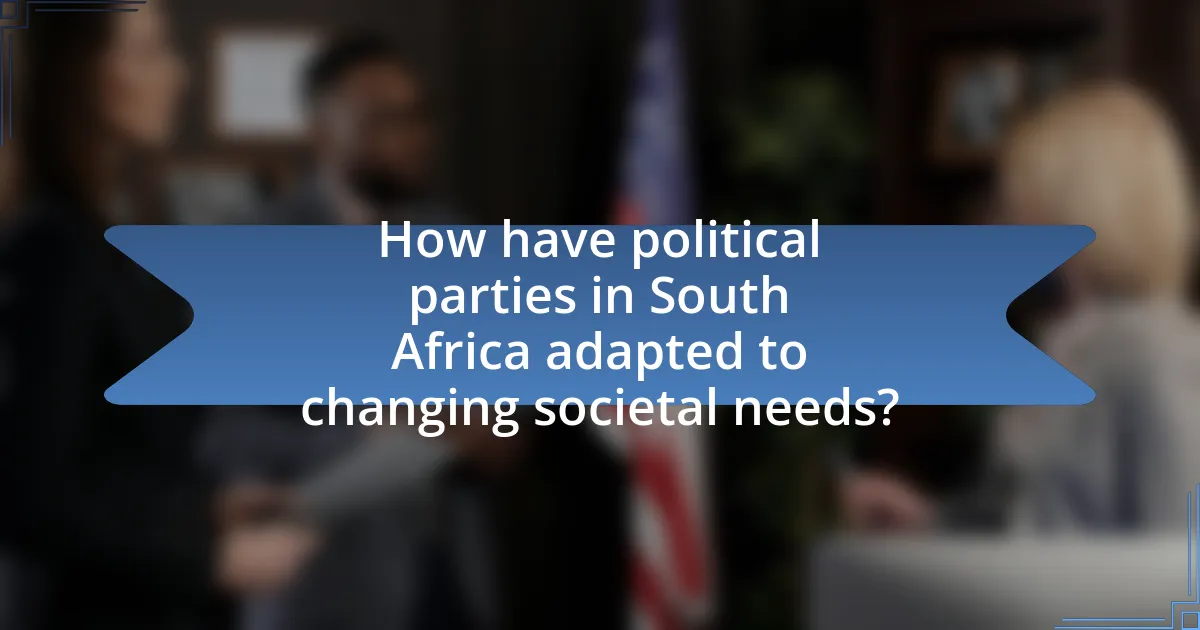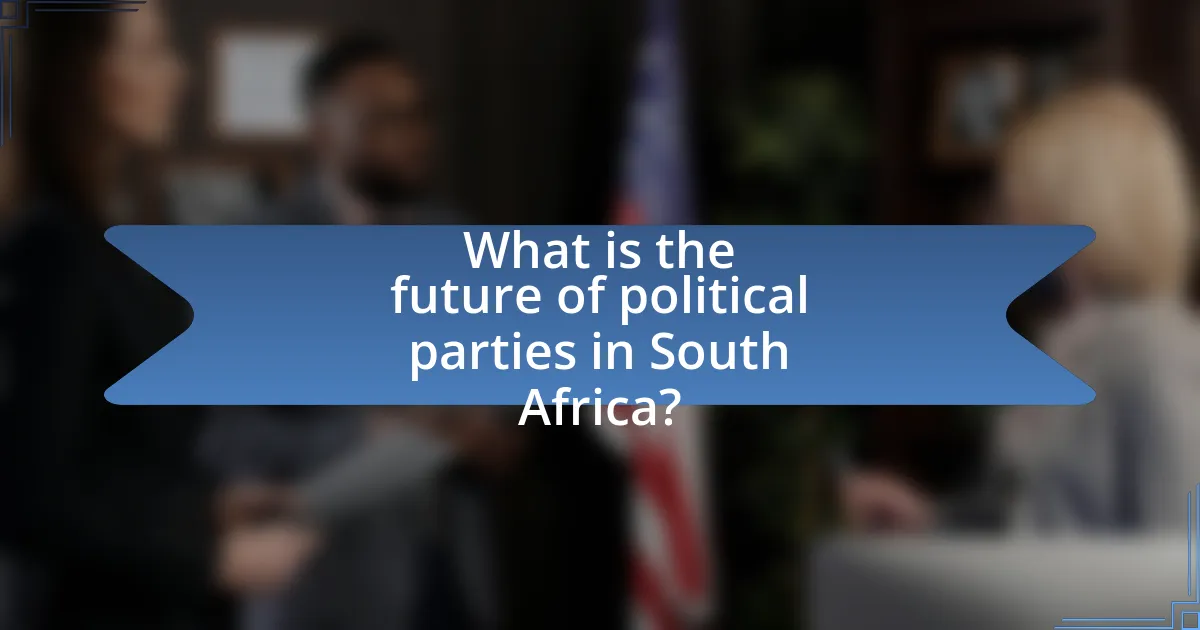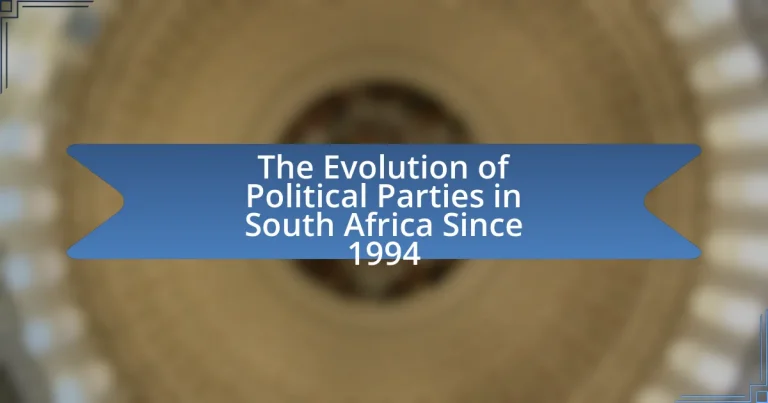The article examines the evolution of political parties in South Africa since the end of apartheid in 1994, highlighting the dominance of the African National Congress (ANC) and the emergence of significant opposition parties such as the Democratic Alliance (DA) and the Economic Freedom Fighters (EFF). It discusses key events that shaped the political landscape, including the establishment of a multi-party system, the impact of corruption on party credibility, and the challenges of voter apathy. The article also explores how political parties have adapted to societal needs, engaged younger voters, and responded to economic challenges, while considering the future dynamics of South Africa’s political environment.

What is the Evolution of Political Parties in South Africa Since 1994?
Since 1994, the evolution of political parties in South Africa has been marked by the dominance of the African National Congress (ANC), the emergence of opposition parties, and significant political realignments. The ANC, which led the anti-apartheid struggle, won the first democratic elections in 1994 and has maintained a majority in subsequent elections, although its support has declined over time due to issues like corruption and service delivery failures.
Opposition parties such as the Democratic Alliance (DA) and the Economic Freedom Fighters (EFF) have gained traction, with the DA becoming the official opposition by 2014 and the EFF emerging as a significant force in 2014, advocating for radical economic transformation. The political landscape has also seen the fragmentation of parties, with several splinter groups forming from the ANC, reflecting internal dissent and ideological shifts.
The 2019 elections highlighted these dynamics, as the ANC secured 57% of the vote, while the DA and EFF garnered 21% and 10% respectively, indicating a growing challenge to ANC hegemony. This evolution illustrates a complex interplay of continuity and change in South Africa’s political party system since the end of apartheid.
How did the political landscape change in South Africa after 1994?
The political landscape in South Africa changed significantly after 1994 with the end of apartheid and the establishment of a democratic government. The African National Congress (ANC) emerged as the dominant political party, winning the first multiracial elections in April 1994, which marked a transition from a racially segregated system to one based on universal suffrage. This shift led to the introduction of a new constitution in 1996, which enshrined human rights and equality. Additionally, the political scene saw the rise of opposition parties, such as the Democratic Alliance (DA) and the Economic Freedom Fighters (EFF), reflecting a more pluralistic political environment. The ANC’s governance has faced challenges, including corruption scandals and internal divisions, which have influenced voter sentiment and party dynamics.
What were the key events that influenced the formation of political parties post-1994?
The key events that influenced the formation of political parties in South Africa post-1994 include the end of apartheid, the establishment of a democratic government, and the subsequent elections. The transition from apartheid to democracy in 1994 marked a significant turning point, allowing for the formation of new political parties that represented diverse interests. The African National Congress (ANC) emerged as the dominant party, winning the first democratic elections, while other parties like the Democratic Party (now the Democratic Alliance) and the Inkatha Freedom Party (IFP) also gained prominence. Additionally, the Constitutional Assembly’s work in drafting the new constitution facilitated the emergence of parties that aligned with various social, economic, and cultural agendas, reflecting the country’s complex demographics and political landscape.
How did the end of apartheid impact political party dynamics?
The end of apartheid significantly transformed political party dynamics in South Africa by enabling the formation of a multi-party system and increasing political participation among previously marginalized groups. Following the 1994 elections, the African National Congress emerged as the dominant party, reflecting the majority’s support for its anti-apartheid stance. This shift led to the establishment of new political parties, such as the Democratic Alliance and the Economic Freedom Fighters, which sought to represent diverse interests and challenge the ANC’s hegemony. The introduction of proportional representation further diversified the political landscape, allowing smaller parties to gain representation in Parliament, thereby fostering a more competitive political environment.
What are the major political parties that emerged since 1994?
The major political parties that emerged in South Africa since 1994 include the African National Congress (ANC), the Democratic Alliance (DA), the Economic Freedom Fighters (EFF), and the Inkatha Freedom Party (IFP). The ANC has been the dominant party since the end of apartheid, winning every national election since 1994. The DA, originally formed as the Democratic Party in 1990, has grown significantly and positioned itself as the main opposition party. The EFF was founded in 2013, advocating for radical economic transformation and land expropriation without compensation. The IFP, although established earlier, has continued to play a significant role in South African politics, particularly in KwaZulu-Natal. These parties reflect the diverse political landscape that has developed in post-apartheid South Africa.
What role did the African National Congress (ANC) play in the new political era?
The African National Congress (ANC) played a pivotal role in the new political era in South Africa by leading the transition from apartheid to a democratic government. Following the end of apartheid in 1994, the ANC became the ruling party, establishing a new constitutional framework that emphasized human rights, equality, and non-racialism. The ANC’s leadership under Nelson Mandela was instrumental in fostering national reconciliation and promoting policies aimed at addressing the socio-economic disparities created by decades of racial segregation. The party’s commitment to the Reconstruction and Development Programme (RDP) aimed to improve living conditions for the majority of South Africans, further solidifying its influence in the new political landscape.
How did the Democratic Alliance (DA) position itself in opposition to the ANC?
The Democratic Alliance (DA) positioned itself in opposition to the African National Congress (ANC) by emphasizing its commitment to liberal democratic values, good governance, and anti-corruption. The DA has consistently criticized the ANC for issues such as corruption scandals, mismanagement, and failure to deliver basic services. For instance, the DA’s campaigns have highlighted the ANC’s involvement in the state capture scandal, which undermined public trust in government institutions. Additionally, the DA has sought to attract voters by promoting policies aimed at economic growth, job creation, and social justice, contrasting these with the ANC’s approach. This positioning has been evident in various elections, where the DA has gained support in urban areas, reflecting a shift in voter sentiment away from the ANC.
What significance does the Economic Freedom Fighters (EFF) hold in contemporary politics?
The Economic Freedom Fighters (EFF) holds significant influence in contemporary South African politics as a radical leftist party advocating for economic transformation and social justice. Established in 2013, the EFF has positioned itself as a voice for the marginalized, promoting policies such as land expropriation without compensation and nationalization of key industries. The party’s rise is evidenced by its substantial electoral support, securing 10.79% of the vote in the 2019 national elections, which underscores its role in shaping political discourse and challenging established parties like the African National Congress (ANC). The EFF’s presence has intensified debates around economic inequality and land reform, making it a pivotal player in the ongoing evolution of political dynamics in South Africa since 1994.
What challenges have political parties faced in South Africa since 1994?
Political parties in South Africa have faced significant challenges since 1994, including issues of corruption, factionalism, and declining voter trust. Corruption scandals, particularly involving the African National Congress (ANC), have undermined public confidence in political institutions, with notable cases like the state capture allegations against former President Jacob Zuma. Factionalism within parties has led to internal conflicts, weakening their unity and effectiveness, as seen in the ANC’s leadership struggles. Additionally, declining voter turnout, which dropped from 89% in the 1994 elections to around 65% in 2019, indicates growing disillusionment among the electorate. These challenges have shaped the political landscape and influenced the evolution of parties in South Africa.
How have issues of corruption affected political party credibility?
Issues of corruption have significantly undermined the credibility of political parties in South Africa since 1994. High-profile corruption scandals, such as those involving the African National Congress (ANC) and former President Jacob Zuma, have led to public disillusionment and a decline in trust towards these parties. For instance, the Public Protector’s report in 2016 highlighted the extent of state capture, which involved the manipulation of state resources for personal gain, further eroding the legitimacy of the ANC. As a result, voter confidence has diminished, leading to a decrease in electoral support for parties perceived as corrupt, evidenced by the ANC’s declining share of the vote in recent elections.
What impact has voter apathy had on political party performance?
Voter apathy has significantly weakened political party performance in South Africa since 1994. Low voter turnout reduces the legitimacy and influence of political parties, leading to a disconnect between elected officials and the electorate. For instance, the 2019 national elections saw a turnout of only 65%, a decline from previous years, which resulted in parties like the African National Congress experiencing a drop in support, receiving only 57% of the vote compared to 62% in 2014. This decline in engagement has prompted parties to struggle with policy relevance and voter trust, ultimately affecting their ability to govern effectively and respond to citizens’ needs.

How have political parties in South Africa adapted to changing societal needs?
Political parties in South Africa have adapted to changing societal needs by evolving their policies and strategies to address issues such as economic inequality, social justice, and service delivery. For instance, the African National Congress (ANC) has shifted its focus towards inclusive economic growth and job creation in response to high unemployment rates, which stood at 34% in 2021. The Economic Freedom Fighters (EFF) emerged to advocate for land reform and wealth redistribution, reflecting the demands of marginalized communities. Additionally, the Democratic Alliance (DA) has increasingly emphasized good governance and anti-corruption measures, responding to public dissatisfaction with service delivery failures. These adaptations demonstrate how political parties have recognized and responded to the dynamic socio-economic landscape in South Africa since the end of apartheid.
What strategies have political parties employed to engage younger voters?
Political parties in South Africa have employed various strategies to engage younger voters, including leveraging social media platforms, focusing on youth-centric policies, and organizing grassroots campaigns. Social media, particularly platforms like Facebook, Twitter, and Instagram, have been utilized to reach younger demographics effectively, as evidenced by the significant online presence of parties during election campaigns. Additionally, parties have tailored their policies to address issues that resonate with younger voters, such as education, employment, and climate change, which are critical concerns for this demographic. Grassroots campaigns, including campus outreach and youth forums, have also been instrumental in fostering direct engagement and encouraging political participation among young people. These strategies reflect an understanding of the unique preferences and priorities of younger voters in the evolving political landscape of South Africa since 1994.
How have social media platforms influenced political party campaigns?
Social media platforms have significantly influenced political party campaigns by enabling direct communication between parties and voters, enhancing engagement and outreach. For instance, during the 2019 South African general elections, political parties utilized platforms like Twitter and Facebook to disseminate their messages rapidly and interact with constituents in real-time. This shift allowed parties to target specific demographics with tailored content, increasing voter mobilization. According to a study by the University of Cape Town, 70% of South African voters reported using social media to gather information about political parties and candidates, demonstrating the platforms’ role in shaping public perception and influencing electoral outcomes.
What initiatives have been taken to address youth unemployment by political parties?
Political parties in South Africa have implemented various initiatives to address youth unemployment, notably through skills development programs and job creation strategies. The African National Congress (ANC) has launched the Youth Employment Strategy, which aims to create job opportunities and enhance skills among young people. The Democratic Alliance (DA) has proposed policies focused on reducing red tape for small businesses, which are crucial for youth employment. Additionally, the Economic Freedom Fighters (EFF) advocate for a national youth service program to provide work experience and training. These initiatives reflect a concerted effort by political parties to tackle the pressing issue of youth unemployment in South Africa.
How have political parties responded to economic challenges in South Africa?
Political parties in South Africa have responded to economic challenges through various strategies, including policy proposals, coalition-building, and public engagement. The African National Congress (ANC) has focused on implementing economic reforms aimed at reducing inequality and promoting growth, such as the National Development Plan introduced in 2012, which outlines strategies for economic transformation. The Economic Freedom Fighters (EFF) advocate for radical economic changes, including land expropriation without compensation, to address historical injustices and economic disparities. The Democratic Alliance (DA) emphasizes fiscal responsibility and economic liberalization, proposing policies to attract investment and create jobs. These responses reflect the parties’ differing ideologies and approaches to tackling South Africa’s persistent economic issues, such as high unemployment and poverty rates, which were reported at 34% in 2023.
What economic policies have been proposed by major political parties?
Major political parties in South Africa have proposed various economic policies aimed at addressing issues such as inequality, unemployment, and economic growth. The African National Congress (ANC) has focused on policies like the National Development Plan, which aims for inclusive growth and job creation through infrastructure investment and skills development. The Democratic Alliance (DA) advocates for free market principles, emphasizing tax cuts, reducing government spending, and promoting private sector growth to stimulate the economy. The Economic Freedom Fighters (EFF) propose radical economic transformation, including land expropriation without compensation and nationalization of key industries to redistribute wealth and address historical injustices. These proposals reflect the parties’ differing approaches to economic challenges in South Africa since 1994.
How do political parties address issues of inequality and poverty?
Political parties in South Africa address issues of inequality and poverty through policy formulation, social programs, and legislative initiatives aimed at economic redistribution. The African National Congress (ANC), for example, has implemented policies such as the Expanded Public Works Programme, which aims to create jobs and provide income support to the unemployed. The Economic Freedom Fighters (EFF) advocate for land expropriation without compensation to address historical injustices and promote economic empowerment among marginalized communities. Additionally, the Democratic Alliance (DA) focuses on improving access to quality education and healthcare as a means to uplift disadvantaged populations. These approaches reflect the parties’ recognition of the systemic nature of inequality and poverty, with varying strategies to promote social justice and economic equity.

What is the future of political parties in South Africa?
The future of political parties in South Africa is likely to involve increased fragmentation and the emergence of new political movements. This trend is evidenced by the rise of smaller parties in recent elections, such as the Economic Freedom Fighters and the Democratic Alliance, which have gained significant support by addressing specific voter concerns. Additionally, the ongoing challenges faced by the African National Congress, including internal divisions and declining popularity, suggest that traditional party dominance may diminish, leading to a more competitive political landscape. The 2024 elections are expected to further reflect these dynamics, as voter discontent with established parties continues to grow.
How might emerging political movements shape the future landscape?
Emerging political movements in South Africa are likely to reshape the future landscape by challenging established parties and introducing new ideologies. For instance, movements such as the Economic Freedom Fighters (EFF) have gained significant traction since their formation in 2013, advocating for radical economic changes and land redistribution. This shift reflects a growing discontent with traditional parties like the African National Congress (ANC), which has faced criticism for corruption and failure to address economic inequality. The rise of these movements indicates a potential fragmentation of the political landscape, as they mobilize younger voters and those disillusioned with the status quo, thereby influencing policy debates and electoral outcomes. Historical context shows that political movements can lead to substantial changes; for example, the ANC’s rise to power in 1994 was fueled by mass mobilization against apartheid. Thus, emerging political movements are poised to redefine political alliances and priorities in South Africa’s evolving democracy.
What role do grassroots movements play in influencing established parties?
Grassroots movements significantly influence established parties by mobilizing public support and shaping political agendas. These movements often highlight social issues that resonate with the electorate, compelling established parties to address these concerns to maintain relevance and voter support. For instance, the rise of the Fees Must Fall movement in South Africa pressured political parties to reconsider their stances on education funding and access, demonstrating how grassroots activism can lead to policy shifts. Additionally, grassroots movements can serve as a source of new leadership and ideas, challenging the status quo within established parties and fostering a more responsive political environment.
How can political parties innovate to remain relevant in a changing society?
Political parties can innovate to remain relevant in a changing society by embracing technology and enhancing engagement with constituents. For instance, the use of social media platforms allows parties to communicate directly with voters, gather feedback, and mobilize support quickly, as seen in the rise of digital campaigning in recent elections. Additionally, adopting data analytics can help parties understand voter preferences and tailor their policies accordingly, which has been effective for parties like the Democratic Alliance in South Africa. Furthermore, fostering inclusivity by addressing diverse social issues and engaging marginalized communities can strengthen a party’s relevance, as evidenced by the success of movements advocating for social justice.
What lessons can be learned from the evolution of political parties in South Africa?
The evolution of political parties in South Africa teaches that adaptability and responsiveness to public needs are crucial for political survival. Since the end of apartheid in 1994, parties like the African National Congress (ANC) have faced challenges due to internal divisions and public dissatisfaction, leading to a decline in support. For instance, the ANC’s electoral support dropped from 62.15% in 1994 to 57.5% in 2019, highlighting the importance of addressing citizens’ concerns effectively. Additionally, the rise of new parties, such as the Economic Freedom Fighters (EFF) and the Democratic Alliance (DA), illustrates that voters are willing to shift allegiance if they perceive better representation and accountability. This evolution underscores the necessity for political parties to engage with their constituencies and evolve their platforms to remain relevant in a dynamic political landscape.
What best practices can be adopted by new political parties in South Africa?
New political parties in South Africa can adopt best practices such as establishing a clear and inclusive party platform, engaging in grassroots mobilization, and leveraging digital communication strategies. A clear platform helps articulate the party’s vision and policies, which is essential for attracting diverse voter bases. Grassroots mobilization fosters community involvement and builds local support, as evidenced by the success of parties that prioritize local issues and engage directly with constituents. Additionally, utilizing digital communication allows for efficient outreach and engagement, as seen in the increasing use of social media by successful political movements globally, which enhances visibility and interaction with potential voters.
How can established parties improve their engagement with constituents?
Established parties can improve their engagement with constituents by utilizing digital platforms for direct communication and feedback. By implementing tools such as social media, online surveys, and mobile applications, parties can facilitate real-time interactions and gather insights on public opinion. For instance, the African National Congress (ANC) has increased its online presence, allowing for more accessible communication with voters, which has been shown to enhance voter satisfaction and participation. Additionally, hosting community forums and town hall meetings can foster a sense of inclusion and transparency, as evidenced by the Democratic Alliance’s (DA) initiatives to engage with local communities directly. These strategies not only strengthen relationships but also ensure that party policies align more closely with constituents’ needs and concerns.


